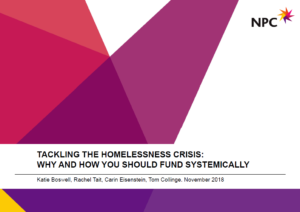The UK is in the midst of a homelessness crisis. On a typical night 4,751 people sleep rough in England—an increase of 169 per cent since 2010—and we know that this is just the tip of the iceberg. Over 250,000 people live in temporary accommodation with thousands more ‘sofa surfing’ or living in cars, tents, squats, or ‘beds in sheds’. Families are living in unsafe, squalid or downright dangerous conditions, with knock-on effects on their health and wellbeing, employment and children’s education.
Philanthropists, trusts and foundations provide vital funding and support to charities that are transforming homeless people’s lives. But this has not been enough to stem the rising tide of homelessness across the UK.
 NPC’s new report Tackling the homelessness crisis: Why and how you should fund systemically looks at how funders and philanthropists can take a different approach. We want to see more funding that addresses the root causes of homelessness and takes a long-term, collaborative and ambitious approach.
NPC’s new report Tackling the homelessness crisis: Why and how you should fund systemically looks at how funders and philanthropists can take a different approach. We want to see more funding that addresses the root causes of homelessness and takes a long-term, collaborative and ambitious approach.
Addressing root causes
Our research identifies root causes of the homelessness crisis—including poverty, welfare reform, austerity and a dysfunctional housing market. Successes like supporting a family to leave temporary accommodation are often undone by these factors which drive people back into homelessness.
Funding needs to be targeted at addressing these root causes, as well as funding the immediate needs of people affected by homelessness. This could mean supporting charities to campaign on issues like welfare reform and social housing. But there are other ways to influence the root causes beyond policy levers—for example, social investment in affordable housing or increasing take-up of the Living Wage to tackle low pay.
Long-term, collaborative funding
Funders working alone cannot hope to tackle the homelessness crisis, no matter how much they understand the root causes. Collaboration—including working across traditional boundaries and committing for the long term—is essential to preventing and ending homelessness.
Data on current homelessness funding is patchy, but our research suggests a fragmented landscape. Analysis of 360Giving’s GrantNav reveals most of the grants in the last five years were for one year or less, with some charities receiving up to 45 grants. Some funders share learning—for example through ACF’s housing and homelessness network—but there are no sustained efforts to pool knowledge and resources for greater impact.
We think there is potential to go further. In the US, Funders Together to End Homelessness looks at the whole system and agrees long-term funding priorities shaped by people with experience of homelessness. We believe a similar approach would benefit the UK sector. This could build on existing local collaboration in areas from Manchester and Glasgow to Oxfordshire and Ipswich.
A funder collaborative to end homelessness in the UK could look at the whole system and prioritise areas where they can make the most difference. Trusts, foundations and individual philanthropists bring independent resources and can take risks that government can’t—for example piloting and scaling effective approaches. They can use a variety of assets in pursuit of their mission—from grants and investments to influence and convening power.
Ambitious funding
The scale and complexity of homelessness can make the problem seem insurmountable. But we don’t have to accept that homelessness will always be with us. We have reduced homelessness before in the UK, so we know that it is possible to tackle the problem.
Ambitious funding works to change the status quo, rather than accepting it. Philanthropy has often transformed issues which have seemed intractable at the time—from marriage inequality in the US to apartheid in South Africa. Looking back now it seems that change was inevitable but all these issues faced tipping points and in these moments philanthropy played a key role in supporting change. The Civil Marriage Collaborative invested $153 million in work that changed hearts and minds on marriage equality.
The current crisis is a tipping point for homelessness in the UK. Homelessness will continue to devastate lives if we carry on addressing the symptoms in isolation. If funders want to change the status quo, they need to look at the whole system, work together, and dare to imagine a world without homelessness.
Katie Boswell is Deputy Head of Funders at NPC.



Comments (0)